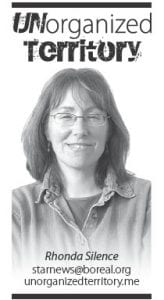It’s interesting that it was during Sunshine Week—the week intended to promote dialogue about the importance of open government and freedom of information—that the Cook County Board of Commissioners tackled the question of public participation in county board meetings.
Sunshine Week, a national initiative of journalists, citizens and community groups, was March 15 – 21, 2015. Smack dab in the middle of Sunshine Week was the county board meeting on March 17 and on the agenda was a “mini-orientation” for the board with County Attorney Molly Hicken on how and when the county board should—and shouldn’t—accept public comment.
This has been a topic on just about every local board and commission’s agenda at some point in the past. The City of Grand Marais and School District 166 have their policies regarding public comments printed in their agenda packets.
How these various boards and commissions developed their policies on allowing public comment is not necessarily news, but in most cases, the News-Herald covered the debate because it was interesting to us as journalists.
But somehow, the county’s board discussion on its public comment policy got pushed aside in all of the other news of the week during Sunshine Week.
It happens more frequently than I would like. Every week I sit in a meeting of the county board or school board or township or other meetings, frantically taking notes, starring and underlining the things that must be followed up on; that must be published this week. I leave the meeting with a notepad brimming with stories, my brain buzzing with ideas.
Every agenda item has the potential for a full-blown, in-depth, follow up article. Often it happens. Sometimes it doesn’t. Such is the case with the Sunshine Week discussion about public comment.
That certainly does not mean that I don’t think the discussion is important. I’m glad that the county board is talking about it. And, like some members of the community, I’m concerned at the possibility of public comment being restricted.
As County Attorney Molly Hicken, who led the discussion, told the county board, “You’re basically balancing your ability to conduct county government activities with First Amendment rights.”
Although the county does not have its guidelines for public comment printed on its agenda, there is a written policy, presented to the board by County Attorney Hicken at the March 17 meeting. The policy states: . Public may address any matter of county concern. . Public asked to state name, address, and topic. . Comments limited to five minutes. . Comment period limited to 30 minutes. . Commissioners may ask/answer questions, but the purpose of the comment period is not to allow for debate. . At board’s discretion, a matter addressed during the comment period may be added to current or future agenda. . Discussion must be civil, respectful, and directed at the board, not at other members of the public.
The guidelines seem reasonable— until a citizen has something to say that can’t be said in five minutes. Or until a controversial issue has a dozen citizens wanting to speak which pushes the comment period far past its 30-minute time frame. And the guidelines don’t state whether or not commissioners will allow citizens to take part in discussion outside of the pre-meeting comment period.
That is the tricky part. What happens when a citizen speaks in the comment period and then remains in the audience for discussion later—and raises his or her hand to speak? Or when a commissioner realizes that the citizen has a piece of information that could be helpful and calls on them? Or if a citizen comes not for the public comment period, but for the agenda item he or she feels passionate about?
Attorney Hicken said if commissioners take one comment from the audience on an issue, they must take all comments on that issue, literally opening the meeting for another public comment period.
Commissioner Frank Moe asked if this had been a problem and it was agreed that to date it hadn’t been. Board Chair Heidi Doo-Kirk said citizens have done a pretty good job policing themselves and respecting the county’s public comment guidelines.
The board ultimately didn’t make any drastic changes to its policy. It was agreed that a public comment period should be added to county work sessions, but other than that the consensus seemed to be to leave the status quo.
Which is good news for Sunshine Week. Being flexible and open to public comment and trusting citizens to participate in government with cooperation and civility is a win-win for everyone.
We must never forget that the
free flow of information is
essential to a democratic society.
President Bill Clinton



Loading Comments